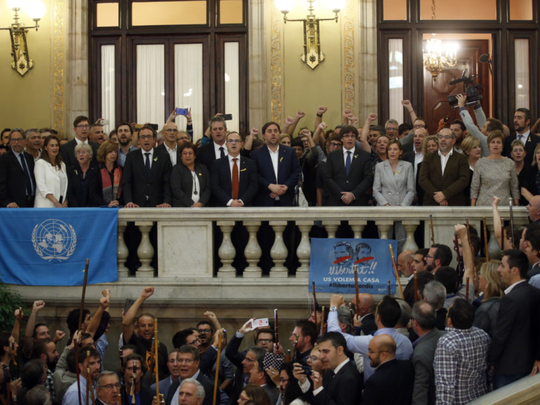
Barcelona: The Spanish Senate gave the central government in Madrid unprecedented powers over Catalonia on Friday just minutes after the breakaway region declared independence, sharply escalating a constitutional crisis in the centre of western Europe.
The two votes — one for independence, one to restore constitutional rule — came in duelling sessions of parliaments in Barcelona and Madrid.
The central government easily won permission to take over control of Catalonia. Meanwhile, secessionists in Catalonia faced bitter recriminations from Catalan foes who called the move for nationhood a coup and a historical blunder, a month after a referendum that backed a split from Spain.
The widening impasse has left little middle ground in Spain for possible compromises and has spilled over to the European Union, whose leaders fear another internal crisis after major upheavals such as Britain’s exit from the bloc and the financial meltdown in Greece.
Immediately after the vote for independence, the president of the European Council Donald Tusk, tweeted, “For EU nothing changes. Spain remains our only interlocutor. I hope the Spanish government favours force of argument, not argument of force.”
Tusk’s remark mirrors fears in Catalonia that the Spanish government will employ police and harsh tactics to take back control of the newly declared republic.
The final ballot was 70-10 in favour of the declaration of independence in the Catalan parliament, where 55 deputies declined to vote, showing the deep divisions.
“We have won the freedom to build a new country,” Catalonia’s vice president Oriol Junqueras tweeted.
Earlier in Madrid, Prime Minister Mariano Rajoy urged the Senate to grant the central government extreme powers to establish control over Catalonia.
After the Senate invoked the never-before-used Article 155 of Spain’s 1978 constitution, the central government could move swiftly to remove the Catalan president, suspend his ministers and assume authority over the region’s public media, police and finances.
Rajoy told the Senate that his government had repeatedly tried to rein in the secessionists in Catalonia. He scoffed at Catalan President Carles Puigdemont’s repeated offers of “dialogue” to end the impasse.
“The word dialogue is a lovely word. It creates good feelings,” Rajoy said. “But dialogue has two enemies: those who abuse, ignore and forget the laws, and those who only want to listen to themselves, who do not want to understand the other party.”
Rajoy urged the Senate to approve Article 155 “to prevent Catalonia from being abused.”
“Catalans must be protected from an intolerant minority that is awarding itself ownership of Catalonia, and is trying to subject all Catalans to the yoke of its own doctrine,” the prime minister said.
In Barcelona, shouts of “independence!” and “democracy!” rose from an antechamber where hundreds of onlookers, including dozens of regional mayors, had gathered.
The eruption was answered by disdain from anti-secessionists in the chamber. A member of the Catalan Socialist Party, Daniel Fernndez, asked: “What is this? The storming of the Bastille?”
Carlos Carrizosa of the Ciudadanos party decried the prospect of a declaration of independence, comparing it to a coup. He pointed at Puigdemont and said: “You, president, have been pro-independence your whole life. This whole plan was already laid out.”
“This movement is textbook populism, full of magical thinking, that reality has destroyed. You are willing to sacrifice all, for your pure fanaticism,” said Alejandro Fernandez, a Catalan lawmaker whose Popular Party is also running the central government.
On Thursday, facing a looming deadline to act, Puigdemont appeared in the government palace in Barcelona and said the regional parliament must decide what will happen next.
Puigdemont’s words Thursday clearly upset many of his constituents, who believed they were getting close to forming a new republic.
“They don’t care about the people, because we already voted for independence,” said Joana Romera, 25, a university student who had come to the Catalan government palace to hear what Puigdemont had to say.
“At the end, it’s always the politicians who decide,” she said, flashing disappointment and anger. “We’re in the same situation as before.”
Puigdemont denounced what he described as heavy-handed tactics by the central government in Madrid.
“I have considered the possibility of calling elections,” Puigdemont said. But he ruled it out because “there are not enough guarantees” from the central government not to seize control of the region.
Puigdemont reportedly sought a promise from Rajoy that the Spanish senate would not vote on Article 155 — a “nuclear option” that has never been tried.
More than 2 million people cast ballots earlier this month for independence, though the turnout for the referendum was around 40 per cent of eligible voters.
During the vote, Spanish national police and Guardia Civil paramilitary officers used harsh tactics, in some cases beating voters with rubber batons and dragging people away from the ballot boxes.
The president of Spain’s Basque region, Inigo Urkullu, a key intermediary between Rajoy and Puigdemont, told journalists the situation is Catalonia “was very worrying” and required “responsibility” on the part of the two sides.”
But he allowed himself note of optimism. “I think there is still time to reach a solution,” Urkullu said in Spanish and then added in the local Basque language. “And we are trying.”












